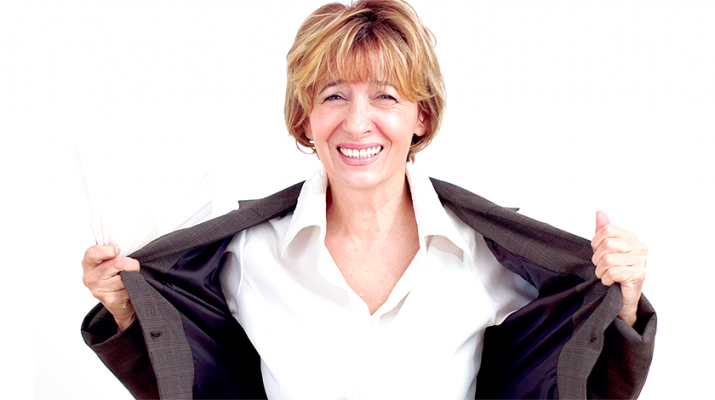Learn how to manage major menopausal symptoms
By Barbara Pierce
“I’ve reached the stage of menopause where I’m constantly either having a hot flash or feel freezing cold. Sometimes there is a very brief moment, usually just before or just after a hot flash, when I feel comfortable. I tell you, it’s not easy being me,” says Cynthia Quackenbush of Herkimer on her blog “Mohawk Valley Girl: My Totally Fun Blog about My Life in the Mohawk Valley.”
Quackenbush, 54, has been having hot flashes for a few years. “They started as warm surges, then gradually got worse,” she said.
Hot flashes are the most common symptom of menopause, said Barb DePree, a gynecologist who specializes in menopause, online. It is probably the most troubling symptom for many women as well.
They come in the form of bursts of intense warmth and sweating that cause one to want to tear off all her clothes.
A normal transition that every woman will face in her lifetime, menopause is a shift in hormones that can cause a whole array of symptoms. It affects every woman differently. Some women may go through menopause with very few symptoms; others will have every symptom.
The age you experience menopause varies. The average age is 50, said DePree. The range is from 40 to 58. For most women, the changes start at age 40.
Hot flashes make up to 90 percent of women miserable. And they can actually continue as long as 14 years, according to a recent study.
And in a particularly unfair hormonal twist, the earlier hot flashes start, the longer they last.
Identify your triggers
While hot flashes are maddeningly unpredictable, they often seem associated with certain triggers, which are unique to every woman. Try to identify yours.
DePree suggests triggers may include:
— Smoking: Yet another reason to quit. A study found that smokers overall were about twice as likely to suffer from severe and frequent hot flashes than nonsmokers.
African-American smokers were 84 percent more likely to suffer intense hot flashes than nonsmokers; white smokers 56 percent more likely.
— Alcohol: Experiment to determine whether this is a trigger for you, at what level, and which alcohol.
— Spicy foovds and hot drinks
— Hot, stuffy, or crowded rooms
— Activities that produce heat, such as ironing, washing dishes, and strenuous exercise
— Sexual arousal
— Stress: The more stressed you are, the more hot flashes you’re likely to have.
Possible remedies:
For most of us, hot flashes are uncomfortable and inconvenient. For some of us, hot flashes are debilitating and make it hard to sleep or function normally.
Except for hormone therapy, no treatment regimen is guaranteed to alleviate them. A government study in 2002 advised against hormone therapy, as it is not safe for many women.
For some women, these techniques work well and not so much for other females. As in so much of life, it’s a matter of experimenting until you discover what works for you.
— Exercise: Women who exercise regularly have fewer hot flashes than women who don’t.
— Lose weight if necessary. A higher body mass index is related to more frequent hot flashes.
— Control your environment: Keep your home, especially your bedroom, cool. Use cotton sheets. Wear clothes in layers you can shed. “I’ve had to stop wearing sweatshirts and sweaters,” said Quackenbush.
— Manage stress: When you’re heating up, remember that, while uncomfortable, hot flashes aren’t life-threatening or even particularly noticeable to others. Instead of panicking, take deep, relaxing breaths. Get up and walk around. Try meditation, massage, yoga, relaxation or other forms of therapy.
“The only thing that helps me is to not worry about it,” said Quackenbush. “I know it will pass.”
Maintain a sense of humor. “I have a sense of humor about it,” said Quackenbush. “On a really cold day, I say: ‘I could sure use a hot flash now!’”
— Prepare for romantic evenings: Drink cold beverages or eat a non-spicy meal. Wear cotton; make sure the temperature in your bedroom is cool.
— Botanical remedies: Some botanicals relieve hot flashes. Some women are helped; others aren’t. Talk with your health care professional before you begin, as some herbal supplements can interact with medication you’re taking or exacerbate a condition you have.
— Black cohosh: Commonly used in Europe, this member of the buttercup family may be the most promising herbal treatment for hot flashes. “It’s the most common thing for hot flashes; we sell a lot of it. It works for many people,” said Ellen Poulette. David and Ellen Poulette own and operate Cooperstown Natural Foods. “Some women think it’s great; others don’t notice any difference when they take it. Everyone is different. Nothing works for everyone.”
Soy and red clover contain plant-based estrogen, which isn’t as effective and doesn’t work the same way as the estrogen synthesized for hormone treatments. Still, some women say they help.
— Vitamin E — Scientific evidence is scant, but some women say this works.
For more information from DePree on hot flashes, see middlesexmd.com.

